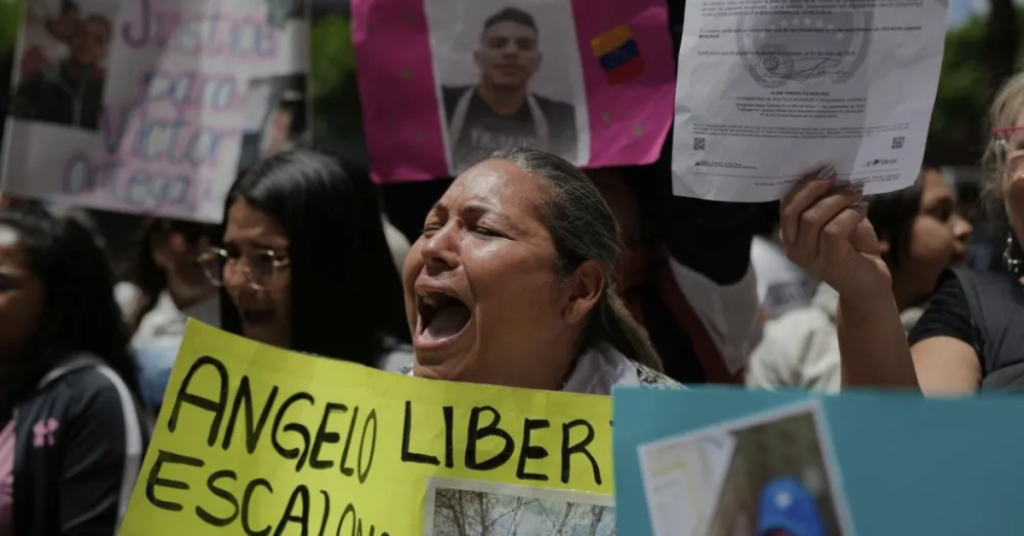A new U.S. intelligence report has challenged the Trump administration’s claims regarding the alleged links between the Tren de Aragua gang and the Venezuelan government. These claims have been used to justify invoking the Alien Enemies Act and speeding up the deportation of Venezuelan migrants, a policy that has raised significant concerns.
The intelligence report, classified and released by the National Intelligence Council earlier this month, reveals that there is no evidence of coordination between the Venezuelan government, headed by President Nicolás Maduro, and the Tren de Aragua gang.
This gang, which originated from a Venezuelan prison, has gained notoriety for its criminal activities, including smuggling, extortion, and other violent crimes across Latin America. However, according to the new assessment, the Venezuelan government is not involved in any way with the gang’s operations, as previously suggested by the Trump administration.
This assessment stands in stark contrast to earlier statements made by officials within the Trump administration. The previous claims suggested that the gang was not only active in Venezuela but was also working under the direct influence of Maduro’s government.
Officials had used these claims to justify the deportation of Venezuelan migrants under the Alien Enemies Act, a law that allows the U.S. government to expel individuals deemed to pose a national security threat.
The latest intelligence report, which is much more detailed and comprehensive than an earlier assessment released in February, brings together insights from all 18 agencies that comprise the U.S. intelligence community.
According to two U.S. officials familiar with the report, the findings are clear: while there have been some instances of minimal contact between certain gang members and lower-level Venezuelan government officials, there is no evidence to suggest that the government, or President Maduro himself, is coordinating with the Tren de Aragua gang.
The intelligence assessment emphasises that any interactions between members of the gang and Venezuelan officials were at a very low level and did not involve any high-ranking or influential figures in the government.
This is a crucial distinction because it undermines the narrative put forward by Trump officials that the Venezuelan government is somehow complicit in the gang’s activities. Instead, the intelligence community has consistently found that there is no indication that the Venezuelan government is directing or supporting the actions of the Tren de Aragua gang.
The intelligence assessment also provided substantial sourcing and evidence to back up its conclusions. It drew on input from a wide array of intelligence agencies, including the CIA, NSA, and DIA, among others. This is a strong validation of the conclusions drawn, as the report represents the collective intelligence of the U.S. government. The agencies involved are known for their thoroughness in assessing national security threats, and their findings carry significant weight.
However, despite the consensus among the 18 intelligence agencies, there was one notable dissenting opinion. The FBI, which is also part of the U.S. intelligence community, disagreed with the report’s findings.

This difference in opinion highlights the complex nature of intelligence work, where different agencies can sometimes arrive at conflicting conclusions based on the data they analyse. Nevertheless, the majority view from the U.S. intelligence community remains firm: there is no solid evidence linking the Venezuelan government to the Tren de Aragua gang.
The Trump administration’s claims about Venezuela and its connection to criminal organisations like Tren de Aragua have been a point of contention for several months. Officials used these claims to justify tough measures against Venezuelan migrants, including detaining them and expediting their deportation from the U.S. under the premise that these individuals could pose a national security risk. The administration’s use of the Alien Enemies Act to deport Venezuelans was part of a broader effort to tighten immigration policies and control the flow of migrants into the U.S.
However, the new intelligence assessment casts doubt on the validity of these policies, as it indicates that there is no clear link between the Venezuelan government and the gangs that are allegedly involved in criminal activities. This raises questions about the justification for the deportation of Venezuelan migrants based on national security concerns, especially when the intelligence report points to a lack of evidence supporting the administration’s claims.
The controversy surrounding the Trump administration’s claims and the intelligence assessment has sparked a broader debate about immigration policy and the treatment of migrants. Critics argue that the administration’s approach to Venezuelan migrants has been unjust, as it is based on inaccurate or exaggerated claims.
They say that the focus should be on addressing the root causes of migration, including economic instability and political persecution, rather than using national security as a pretext for deportation.
In response to the report, some lawmakers and advocacy groups have called for a reevaluation of the administration’s policies toward Venezuelan migrants. They argue that the government should not use flawed intelligence or baseless claims as a justification for harsh deportation measures. They also point out that many Venezuelan migrants are fleeing a country in crisis, and subjecting them to deportation without solid evidence of criminal activity is both unjust and counterproductive.
Despite the disagreement within the intelligence community, the latest report marks a significant moment in the ongoing debate about the U.S. government’s treatment of migrants and its approach to immigration policy. It challenges the narrative that has been used to justify the deportation of Venezuelan nationals and provides a more nuanced understanding of the situation.
Disclaimer: This article has been meticulously fact-checked by our team to ensure accuracy and uphold transparency. We strive to deliver trustworthy and dependable content to our readers.


